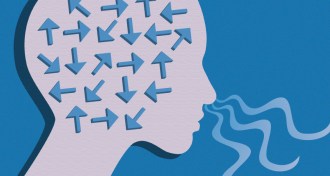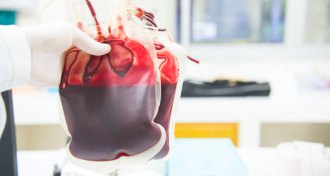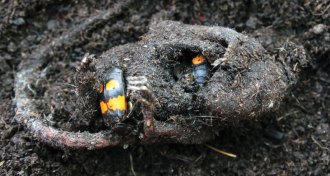All Stories
-
 Science & Society
Science & SocietyWaking up early to cover science’s biggest honor
Editor in Chief Nancy Shute discusses how the Science News editors and reporters cover the Nobel Prizes each year.
By Nancy Shute -
 Health & Medicine
Health & MedicineA mysterious polio-like disease has sickened as many as 127 people in the U.S.
Medical experts are trying to trace the cause of 62 confirmed cases of acute flaccid myelitis this year.
-
 Archaeology
ArchaeologyAn ancient child’s ‘vampire burial’ included steps to prevent resurrection
A 10-year-old skeleton in a Roman cemetery had a stone placed in its mouth to prevent the youngster from rising from the dead, researchers say.
By Bruce Bower -
 Neuroscience
NeuroscienceTo unravel autism’s mysteries, one neuroscientist looks at the developing brain
Autism researcher Kevin Pelphrey focuses on understanding signs of the disorder in the developing brain, which could shed light on the condition.
-
 Neuroscience
NeurosciencePeople who have a good sense of smell are also good navigators
A sense of smell and a sense of direction are tangled in the brain, a new study finds.
-
 Life
LifeExplore the history of blood from vampires to the ‘Menstrual Man’
Rose George’s book ‘Nine Pints’ offers readers an engaging and insightful cultural and scientific history of blood.
-
 Animals
AnimalsIn cadaver caves, baby beetles grow better with parental goo
A dead mouse — with the right microbial treatment from beetle parents — becomes a much better nursery than your average carcass.
By Susan Milius -
 Agriculture
AgricultureAdd beer to the list of foods threatened by climate change
Barley crops around the world will be threatened by drought and heat.
-
 Animals
AnimalsHow nectar bats fly nowhere
Exquisitely sensitive tech makes first direct measurements of the forces of bat wingbeats.
By Susan Milius -
 Environment
EnvironmentWe’re probably undervaluing healthy lakes and rivers
Clean water legislation often doesn’t seem like a good deal on paper. Here’s why that may be misleading.
-
 Genetics
GeneticsGenealogy databases could reveal the identity of most Americans
Keeping your DNA private is getting harder.
-
 Astronomy
AstronomyThe Neil Armstrong biopic ‘First Man’ captures early spaceflight’s terror
At a time when NASA is considering how to return astronauts to the moon, ‘First Man’ is a sobering reminder of how risky the first giant leap was.